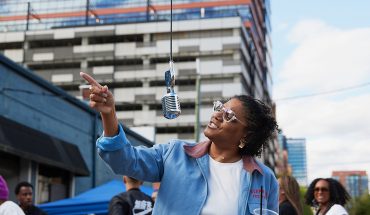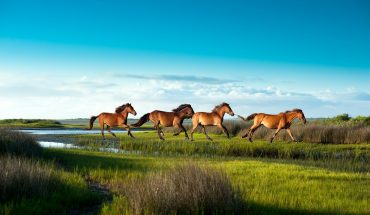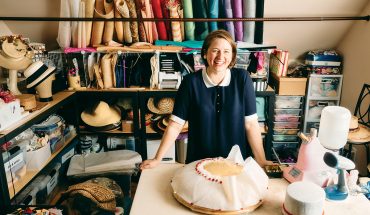by Liza Roberts
photographs by Mark Petko
As Bett Padgett welcomes yet another stranger into her Raleigh home on this bright-green evening, she’s doing something she considers vital: Sharing music.
Tonight, she’s sharing it with about 90 people who have come to hear renowned Irish folk singer/songwriter Gerry O’Beirne sing and play guitar in her living room. He’s here on a short American tour from his home on Ireland’s Dingle Peninsula, and the gathered crowd sits quietly in anticipation, packed into rows of chairs that sprawl from Padgett’s living room into an adjacent sitting room, and fill a fern-hung sun porch.
This is a crowd that comes early, and they’ve already devoured most of the deviled eggs, lemon cupcakes, beer, and wine they brought with them. About half the people gathered are regulars like Dan Sargent, 51, a musician and database administrator from Morrisville who says the intimacy of Padgett’s concerts is the best way to hear music; the others are brand-new, strangers who heard about the concert from a friend or colleague. Now they all whisper and wait.
Padgett has invited the community in for house concerts like this one more than 100 times over the last 14 years. It’s a labor of love for this 63-year-old in Birkenstocks, a singer, songwriter, community activist, and guitar teacher who regularly books the talent, invites the public, moves the furniture out, hauls the chairs in, and sets the stage. She collects donations for the artists ($15 per person is suggested), sets up a table to sell CDs for them, and makes not a dime in the process.
“It’s a wonderful way to bring the community together,” she says. It’s also draining. She pushes back the wavy, graying hair that hangs nearly to her waist, exposing dangling earrings in the shape of silver clef notes. “This is my last year.”
Padgett got the idea to host house concerts after a stint at the Swannanoa Gathering, a summer folk art workshop at Warren Wilson College in Asheville. Her fellow musicians – O’Beirne among them – played for one another, and Padgett was “blown away by the talent.” These were not folks who played at big venues, or for large audiences. She thought that was a shame.
So, in July 2000, she invited the community at large to her house – a 1932 farmhouse that sits atop a hill and overlooks three lush acres on Lake Boone Trail in Raleigh – to hear the duo Leslie Ritter and Scott Petito. “It was just so cool,” she says. So were the rest of the concerts. “They’re all my favorite.”
Padgett’s convinced the house is more than a bit player in the whole thing, and her husband, Bill, seems happy to agree. “Before we even set foot indoors,” she says, “I said, we’re going to have house concerts here.” It was a sense she got from the land, the stone wall she spied on her way up the drive, the setting. “Have you ever been to a place where you just connected?”
The artists come because they love the house, too – its setting, and its personality: Collections of gilt-framed landscape art, vintage microscopes, blue glass bottles, telescopes, tin soldiers, and a 40,000-year-old cave bear skull make for an eclectic vibe. And they come because they appreciate playing for the kind of audience Padgett can gather.
O’Beirne surveys the scene from the kitchen doorway. It’s his second time here. “It’s lovely to play to them,” says the singer, in his soft brogue. “You can sense the quality of their silence.” He’s come because of this, and because of Padgett. “She has made a lifelong commitment to music – her own music, and others’,” he says. “She’s tending a flower, keeping it alive. There’s not too many people who do it so well.”
Before he plays, Padgett and her husband Bill call the audience to order for a lightning-quick town-hall-style meeting. They do this every time, addressing a community issue, and asking for a show-of-hands vote to register support or disapproval. They do this in part because they care about a lot of things going on – Bill is president of the Dix 306 group that’s lobbying to turn the grounds of Dorothea Dix Hospital into a park; Bett is a tireless advocate for the preservation of lighthouses – and partly because they are following the letter of the law. By exercising their right to assemble, they’re less likely to run afoul of an ’80s-era ordinance designed to keep fraternities from having too many parties. The rule could limit the number of events they can hold, so they’re careful.
The folks who come tend to be politically like-minded, as they seem on this evening, when a show of hands in support of a Dix park looks pretty unanimous.
Then, in his blue plaid shirt and corduroy flat cap, O’Beirne walks to a tall stool in the corner of the room. A pin could drop as he settles in. “Hello everyone,” he finally says, and then begins to sing a capella, a song that seems essentially Irish, about being born on the “grandeur of my father’s land,” then sailing away, “looking for adventure.”
“This is the way I want to hear my music,” says Sargent, one of the regulars. “There’s a connection you cannot get from a big show.”
Padgett leans against the doorframe and takes it in. “It’s more than just music happening here,” she says. “Before I hang up the microphone, I might do one myself. But I’m going to retire after that. We’d like to travel. We have a lot of other dreams.”




